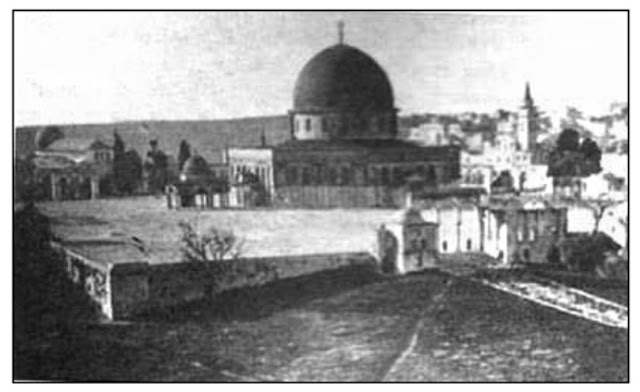 |
| First photo of the Temple Mount |
Since the 19th century, the Al-Aqsa compound has been governed by a Status Quo arrangement, a modus vivendi that prevents discord among conflicting parties. Accordingly, Al-Aqsa’s administration belongs to a Muslim institution, the Jerusalem Islamic Waqf, which is under the custodianship of the Hashemite Kingdom of Jordan. This custodianship has repeatedly been reaffirmed and recognized by the international community, including the United Nations, UNESCO, the Arab League, the European Union, Russia, and the United States, and was officially recognized in the 1994 peace treaty between Israel and Jordan.
After many disputes among European states in the 19th century for control over various holy sites in Jerusalem, the Ottoman Empire issued a series of decrees to regulate the administration of Christian holy sites by determining the powers and rights of various denominations in these places. The most important of these decrees was an 1852 firman by the Ottoman Sultan Abdulmejid I, which preserved the possession and division of Christian holy sites in Jerusalem and Bethlehem, and forbade any alterations to the status of these sites. This arrangement became known as the Status Quo.In 1878, the Status Quo was internationally recognized in the Treaty of Berlin, which was signed between European powers and the Ottoman Empire following the conclusion of the Russo-Turkish War of 1877–1878. Article 62 of the treaty stated that: “It is well understood that no alteration can be made to the status quo in the holy places.” Article 62 of the Berlin Treaty extended the Status Quo to include all holy places and not only Christian sites. The Status Quo arrangement is a unique and delicate legal system that contains a specific set of rights and obligations that were created over centuries of practice and are now considered binding international law. It therefore supersedes any and all aspects of domestic law.
The Sublime Porte having expressed the intention to maintain the principle of religious liberty, and give it the widest scope, the Contracting Parties take note of this spontaneous declaration.In no part of the Ottoman Empire shall difference of religion be alleged against any person as a ground for exclusion or incapacity as regards the discharge of civil and political rights, admission to the public employments, functions and honours, or the exercise of the various professions and industries.All persons shall be admitted, without distinction of religion, to give evidence before the tribunals.The freedom and outward exercise of all forms of worship are assured to all, and no hindrance shall be offered either to the hierarchical organization of the various communions or to their relations with their spiritual chiefs. ...The rights possessed by France are expressly reserved, and it is well understood that no alterations can be made in the status quo in the Holy Places.
Until August 2000, and despite occasional breaches and escalations, the Status Quo functioned relatively smoothly, with the Jerusalem Islamic Waqf collecting small fees from non-Muslims and tourists, who were allowed to enter the holy site provided they followed the rules of the Waqf....[Now,] Temple Mount groups and Israeli extremists enter from al-Magharbeh Gate as well, and the Waqf is prohibited from preventing them from entering the site. The Waqf can no longer prevent Israelis in military fatigues from entering, although this act is banned per the mosque’s regulations.
|
Or order from your favorite bookseller, using ISBN 9798985708424. Read all about it here! |

|

 Elder of Ziyon
Elder of Ziyon






















